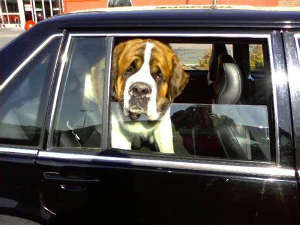Do Dogs Prefer Riding In Electric Vehicles Compared To A Diesel?

Dog lovers often travel with what many might refer to as our ‘best friends’, and more motorists are now transitioning to Electric Vehicles (EVs) because of how eco-friendly the motor trade’s newest invention is.
In a recent study from the University of Lincoln and CarGurus, it revealed UK dog owners have more reason for adopting EVs, claiming dogs are more comfortable riding in an electric vehicle rather than a diesel.
The study is unique and pioneering according to Daniel Mills, Professor of Veterinary Behavioural Medicine at the University of Lincoln who led the study.
The primary objective was to analyse the effects of riding in electric vehicles compared to diesels on a dog’s behaviour and welfare in a two-day study. It involved 20 different dogs, and each dog experienced two 10-minute journeys on the same route.
One journey involved an EV, while the other was in a diesel-powered vehicle. After each ride, the study analysed the dog’s behaviour via scientific measures. It concluded that dogs were more restless in diesel cars than EVs, it also indicated that they reduced car sickness symptoms significantly in an EV.
No evidence from the study suggested that EVs harmed the dog’s welfare, and it invalidates the concerns of restlessness and increased car sickness due to vibration and noise from an electric vehicle, there is a smooth transition from the internal combustion engine to EVs for dogs.
Always check with your private or motor trade insurance broker regarding cover for transferring animals of any kind.
During the study, dogs changed their laying position around 50% more in a diesel vehicle than in an EV, this is possibly due to the noise and vibration differences between the two types of vehicle. More notably, the study indicated that some dogs felt less nauseous in an EV vehicle than in a diesel car, their heart rates decreased by up to 30% in an EV and there were notable behavioural changes.
Contrary to popular belief, the study revealed that dogs actually enjoy vehicle motion, a high heart rate is associated with motion sickness, dogs heart rates in the studies lowered by 66% by riding in both diesels and EVs.

Electronic vehicles are becoming increasingly popular with motorists, no other studies are known to have analysed their effects on dogs until this particular study was commissioned.
The findings clearly indicate dogs are more relaxed in EVs due to their behaviour patterns, Professor Mills also indicated that the revelation of dogs’ decreased heart rates from riding in cars, contrary to the popular belief was unintended and an interesting finding that could lead to more exploration in this area.
The research highlighted that dog owners report over-excitement in 58%, anxiety in 48%, and nausea in 44% while travelling in vehicles. However, of the dogs travelling in EVs, 39% were more settled, 43% calmer, 42% less anxious and 45% whined less.
Dog owners used various tactics to keep their pets relaxed in the car, for example, 47% encouraged dogs to board using treats while 46% placed blankets or toys in the car, 36% familiarised pets travelling in cars through constant drives, while 36% played relaxing music.
It is advisable you research a reputable insurance company before setting of on any journey to safeguard your vehicle if travelling with a dog.







